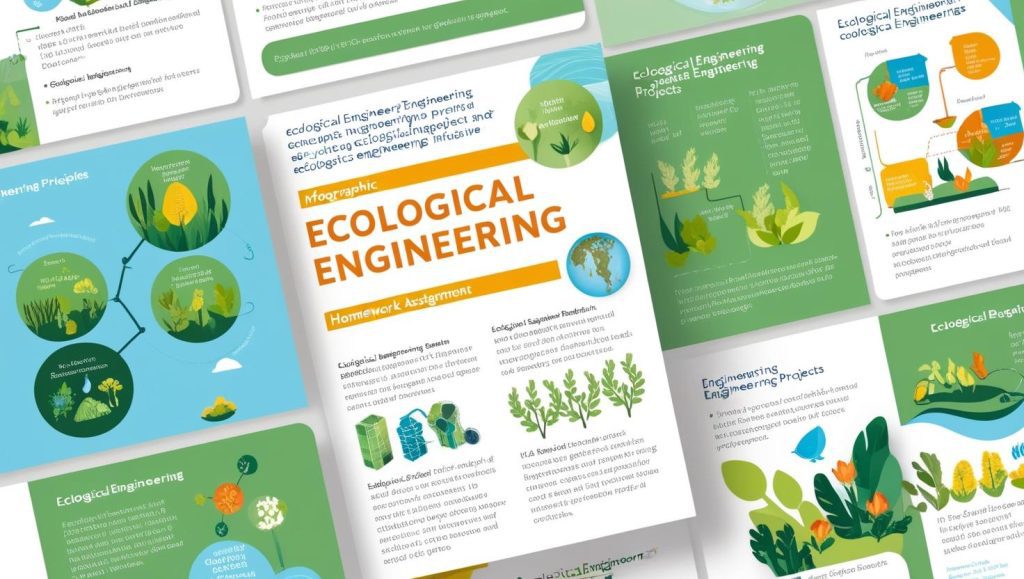Introduction
Ecological engineering is an interdisciplinary field that integrates engineering principles with ecological sciences to design sustainable solutions for environmental challenges. It focuses on restoring and managing ecosystems, improving water quality, and promoting biodiversity conservation.

Many students find this subject complex due to its combination of biology, chemistry, hydrology, and engineering. If you need Ecological Engineering homework help, this guide will cover key concepts, study resources, and expert tips to excel in your coursework.
What is Ecological Engineering?
Ecological engineering applies natural ecosystem processes to solve environmental problems. It is often used in:
- Restoration ecology (e.g., wetland rehabilitation).
- Water resource management (e.g., stormwater treatment).
- Sustainable agriculture (e.g., agroecosystem design).
- Climate change adaptation (e.g., carbon sequestration in forests).
Why is Ecological Engineering Important?
Ecological engineering is crucial for addressing global environmental challenges such as:
- Biodiversity loss – Designing habitats to support endangered species.
- Climate change – Developing carbon sequestration strategies.
- Water pollution – Constructing wetlands to filter contaminants.
- Soil degradation – Using bioengineering techniques to prevent erosion.
External Resource:
- International Ecological Engineering Society (IEES) – Research and case studies on ecological engineering.
Key Topics in Ecological Engineering
If you’re looking for Ecological Engineering homework help, you may encounter the following topics:
1. Ecosystem Restoration and Management
This involves rebuilding degraded environments using ecological principles. Examples include:
- Restoring wetlands to filter water pollution.
- Reforesting areas to combat desertification.
- Enhancing urban green spaces for biodiversity.
External Resource:
- Society for Ecological Restoration (SER) – A global network for ecological restoration professionals.
2. Sustainable Water Management
Water engineering plays a vital role in:
- Designing constructed wetlands to treat wastewater.
- Managing stormwater runoff using biofiltration systems.
- Preventing eutrophication in lakes and rivers.
3. Renewable Energy and Carbon Sequestration
Ecological engineering contributes to:
- Developing bioenergy systems like algae-based biofuels.
- Designing carbon-capturing forests and wetlands.
- Implementing wave and tidal energy solutions.
4. Agroecosystem Design and Soil Conservation
Agricultural engineering focuses on:
- Soil erosion prevention using contour plowing.
- Integrated pest management to reduce chemical use.
- Sustainable irrigation to conserve water.
5. Urban Ecology and Green Infrastructure
Green urban planning includes:
- Rooftop gardens to reduce urban heat.
- Permeable pavements to control runoff.
- Wildlife corridors to connect fragmented habitats.
External Resource:
- United Nations Environment Programme (UNEP) – Research on sustainable cities.
How to Approach Ecological Engineering Assignments
1. Understand the Assignment Requirements
Before starting your Ecological Engineering homework, make sure to:
- Identify whether it involves theoretical concepts or practical applications.
- Research using peer-reviewed journals and government reports.
- Break down the problem into subtopics and case studies.
2. Use Reliable Study Resources
Since ecological engineering involves scientific and engineering principles, using credible sources is essential.
Recommended Resources:
3. Organize Your Homework Effectively
Introduction
- Define ecological engineering and its importance.
- Provide an overview of the topic covered in the assignment.
Main Body
- Include theoretical explanations and case studies.
- Discuss real-world applications (e.g., wetland restoration projects).
- Compare different engineering approaches (e.g., traditional vs. nature-based solutions).
Conclusion
- Summarize the key takeaways.
- Discuss future trends in ecological engineering.
Common Challenges in Ecological Engineering & Solutions
1. Complex Ecosystem Interactions
Understanding how species, water, and soil interact can be challenging.
Solution: Use simulation tools like:
- Ecopath with Ecosim (EwE) – A modeling tool for ecosystem dynamics.
2. Environmental Data Analysis
Assignments often require analyzing pollution data or climate trends.
Solution: Utilize datasets from:
- NASA Earth Data – Satellite data for environmental studies.
3. Engineering Design Challenges
Applying engineering principles to ecological problems can be difficult.
Solution: Refer to case studies in:
Top Platforms for Ecological Engineering Homework Help
If you need Ecological Engineering homework help, these platforms offer expert tutoring and resources:
- Khan Academy – Free educational videos on environmental science.
- Coursera – Online courses from top universities.
- Chegg Study – Homework solutions and tutoring.
- ScienceDirect – Research papers on ecological engineering.
Tips to Excel in Ecological Engineering
1. Stay Updated with Research
Read scientific papers and news related to ecological engineering.
2. Conduct Practical Experiments
Engage in fieldwork, such as:
- Water quality testing.
- Soil health analysis.
- Biodiversity assessments.
3. Join Study Groups & Forums
Collaborate with peers and join online communities like:
- Reddit r/environmental_science
- LinkedIn Ecological Engineering Groups
4. Practice Problem-Solving
Work on case studies and projects related to:
- Green infrastructure development.
- Sustainable agriculture.
- Coastal habitat restoration.
Conclusion
Ecological engineering is an essential field that blends engineering with ecological principles to develop sustainable environmental solutions. By mastering key concepts, using reliable study resources, and seeking Ecological Engineering homework help, students can excel in their coursework and contribute to environmental sustainability.
If you need assistance, explore online platforms, research databases, and expert tutoring services to enhance your learning experience.


